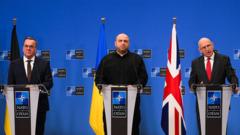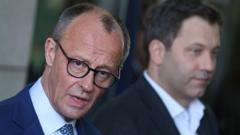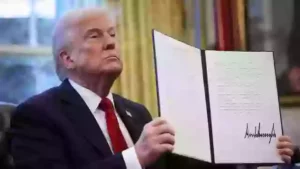Germany's political landscape shifts as Friedrich Merz prepares to assume leadership after securing a coalition agreement, signaling significant impacts for Europe during challenging times.
Coalition Agreement Sets Stage for Friedrich Merz’s Chancellorship in Germany

Coalition Agreement Sets Stage for Friedrich Merz’s Chancellorship in Germany
Friedrich Merz reaches a coalition deal to become chancellor amidst Europe’s ongoing crises.
In a pivotal moment for Germany and Europe, the nation’s centrist parties have announced a coalition agreement on Wednesday, enabling Friedrich Merz, leader of the conservative Christian Democrats, to step into the role of chancellor. This agreement comes in the wake of Merz’s electoral victory in February, at a time when Europe grapples with economic instability and security concerns.
The coalition talks, which lasted approximately six and a half weeks, marked a rapid negotiation process, the swiftest since Angela Merkel’s second term in 2009. Merz faced immense pressure to establish a functional government as international dynamics shifted, particularly with the Trump administration imposing trade tariffs and a less favorable stance towards NATO, coupled with the rising threat posed by Russia.
In an effort to address urgent economic needs, Merz utilized the interim period to pass significant measures through Parliament aimed at increasing debt limits. These measures will enable Germany to invest billions in crucial infrastructure and military enhancements, a response to the pressing global crises.
"As we navigate this unprecedented global change, we must be proactive in shaping Germany’s role in Europe," Merz affirmed to reporters during the coalition presentation. Despite the far-right Alternative for Germany party gaining traction in polls, Merz and the mainstream parties have ruled out any collaboration, identifying it as a threat to the foundations of democracy in the nation.
With the coalition now established, focus shifts to how Merz will lead Germany through these tumultuous times, aiming to define the country's future influence in a rapidly evolving geopolitical landscape.
The coalition talks, which lasted approximately six and a half weeks, marked a rapid negotiation process, the swiftest since Angela Merkel’s second term in 2009. Merz faced immense pressure to establish a functional government as international dynamics shifted, particularly with the Trump administration imposing trade tariffs and a less favorable stance towards NATO, coupled with the rising threat posed by Russia.
In an effort to address urgent economic needs, Merz utilized the interim period to pass significant measures through Parliament aimed at increasing debt limits. These measures will enable Germany to invest billions in crucial infrastructure and military enhancements, a response to the pressing global crises.
"As we navigate this unprecedented global change, we must be proactive in shaping Germany’s role in Europe," Merz affirmed to reporters during the coalition presentation. Despite the far-right Alternative for Germany party gaining traction in polls, Merz and the mainstream parties have ruled out any collaboration, identifying it as a threat to the foundations of democracy in the nation.
With the coalition now established, focus shifts to how Merz will lead Germany through these tumultuous times, aiming to define the country's future influence in a rapidly evolving geopolitical landscape.






















